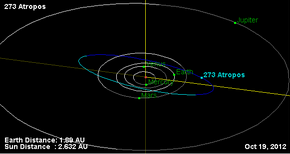273 Atropos
Appearance
(Redirected from (273) Atropos)
 Orbital diagram | |
| Discovery | |
|---|---|
| Discovered by | Johann Palisa |
| Discovery date | 8 March 1888 |
| Designations | |
| (273) Atropos | |
| Pronunciation | /ˈætrəpɒs/[1] |
Named after | Atropos |
| A888 EA, 1910 CC | |
| Main belt | |
| Orbital characteristics[2] | |
| Epoch 31 July 2016 (JD 2457600.5) | |
| Uncertainty parameter 0 | |
| Observation arc | 105.94 yr (38695 d) |
| Aphelion | 2.7792 AU (415.76 Gm) |
| Perihelion | 2.01097 AU (300.837 Gm) |
| 2.39507 AU (358.297 Gm) | |
| Eccentricity | 0.16037 |
| 3.71 yr (1353.9 d) | |
| 127.80° | |
| 0° 15m 57.276s / day | |
| Inclination | 20.454° |
| 158.957° | |
| 121.16° | |
| Physical characteristics | |
| Dimensions | 29.27±1.3 km |
| 23.924 h (0.9968 d)[2] 23.852 h[3] | |
| 0.1624±0.015 | |
| 10.26 | |
273 Atropos is a typical Main belt asteroid that was discovered by Austrian astronomer Johann Palisa on 8 March 1888 in Vienna.
Photometric observations of this asteroid at the Palmer Divide Observatory in Colorado Springs, Colorado, in 2007 gave a light curve with a period of 23.852 ± 0.003 hours and a brightness variation of 0.60 ± 0.03 in magnitude.[3]
References
[edit]- ^ Noah Webster (1884) A Practical Dictionary of the English Language
- ^ a b Yeomans, Donald K., "273 Atropos", JPL Small-Body Database Browser, NASA Jet Propulsion Laboratory, retrieved 11 May 2016.
- ^ a b Warner, Brian D. (December 2007), "Asteroid Lightcurve Analysis at the Palmer Divide Observatory - March-May 2007", The Minor Planet Bulletin, vol. 34, no. 4, pp. 104–107, Bibcode:2007MPBu...34..104W.
External links
[edit]- Lightcurve plot of 273 Atropos, Palmer Divide Observatory, B. D. Warner (2007)
- Asteroid Lightcurve Database (LCDB), query form (info Archived 16 December 2017 at the Wayback Machine)
- Dictionary of Minor Planet Names, Google books
- Asteroids and comets rotation curves, CdR – Observatoire de Genève, Raoul Behrend
- Discovery Circumstances: Numbered Minor Planets (1)-(5000) – Minor Planet Center
- 273 Atropos at AstDyS-2, Asteroids—Dynamic Site
- 273 Atropos at the JPL Small-Body Database
